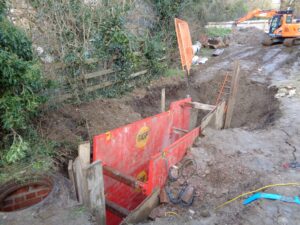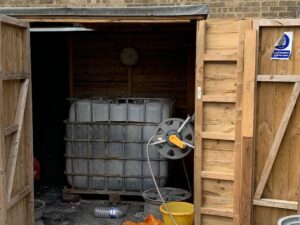Construction company fined after worker killed by an excavator
A North Yorkshire construction company has been fined after a worker was struck on the head and killed by a 16-ton excavator.
On 13 January 2021, Dean Myers, an employee of HACS Construction Ltd, was undertaking groundwork activities in a partially excavated trench at a site in Ripley, North Yorkshire.

During the works, the 56-year-old was struck on the head by the moving bucket of the excavator suffering catastrophic injuries to his face and head. He was pronounced dead at the scene by the ambulance service.
The groundworks team had been preparing the trench for the laying of new drainage. Mr Myers had moved to the foot of an existing manhole directly adjacent to the trench when the excavator was reported to have met resistance whilst digging.
With nothing in place to prevent his entry into the danger zone of the excavator, Mr Myers exited the manhole via a makeshift opening to investigate. However, the excavator driver and other workers were not in a position to see that he had entered the danger zone. Here the excavator bucket then swung into him with fatal consequences.
The Health and Safety Executive (HSE) has guidance on excavator industry safety. The precautions needed include considering clearance, visibility and the bucket attachment.
HSE’s investigation found that HACS Construction Limited had failed to identify or assess the risk arising from using the existing manhole chamber as an improvised refuge. This meant the company failed to implement a system whereby workers were prevented from entering the dangerous working zone of the excavator while the machine was being operated by a driver with limited sight. There was also inadequate supervision on site, alongside a failure to carry out monitoring visits which would have identified crucial safety failings.
At Leeds Magistrates’ Court on 24 January HACS Construction Limited of Station Yard, Ripley, North Yorkshire pleaded guilty to breaching Section 2 (1) of the Health & Safety at Work etc Act 1974. The company was fined £330,500 and ordered to pay £9,141.80 costs.
After the hearing, HSE inspector Ben Caines said: “This tragic incident could so easily have been avoided had HACS Construction Limited simply ensured that adequate control measures and safe working practices were identified and followed.
“The company should have put in place measures including the use of trained plant marshals for high-risk activities, such as the work Mr Myers was undertaking. Such measures are widely recognised and used across the construction industry as well as being advised within HSE and industry guidance.”
This HSE prosecution was brought by HSE enforcement lawyer Gemma Zakrzewski.
Notes to Editors:
- The Health and Safety Executive (HSE) is Britain’s national regulator for workplace health and safety. We prevent work-related death, injury and ill health through regulatory actions that range from influencing behaviours across whole industry sectors through to targeted interventions on individual businesses. These activities are supported by globally recognised scientific expertise.
- More information about the legislation referred to in this case is available.
- Further details on the latest HSE news releases is available.


